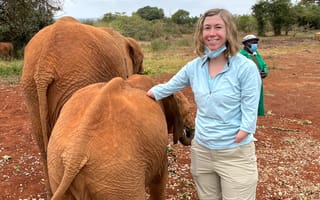
Boston entrepreneur Brittany Palmer loves to travel, and doesn’t let her disability slow her down. A bilateral amputee, she has ventured all over the world, and had plans to travel even more this year.
Then COVID-19 hit, forcing most of the world to go inside and online for entertainment.
Around this time, Palmer began to think about online travel experiences, because this wasn’t the first time she had to limit where she went due to health concerns. Back in 2013 her husband had a brain aneurysm rupture. He recovered fully, but the road was a long one.
“It would have been so nice to have a way to travel while we were in the hospital and at home recovering. It would have been really nice to do that, and focus on something interesting and interactive, as opposed to just watching the TV,” Palmer told Built In.
As she researched the space, Palmer found that more than 40 million people in America have a disability, condition or mobility limitation that either impedes their ability to participate in certain travel experiences, or prevents them from traveling altogether.
That’s what inspired her to create Beeyonder, a platform that allows users to travel anywhere they want without having to leave their home.
Beeyonder officially launched this week, and has a growing roster of nearly 300 digital travel experiences, allowing users to explore the underground crypts of Rome in the morning, then take a cooking class with a Vietnamese chef in the afternoon. Most of the experiences on Beeyonder are live, headed by official guides who can answer questions and interact with travelers in real time. Users can choose to travel privately with just their friends and family, or with a larger group of people from across the internet. All the experiences have been vetted by Beeyonder and can be pre-booked and even gifted, varying in price but typically costing between $20 and $30 per person.

While Beeyonder was designed for people with disabilities, it is for everyone, even beyond the travel restrictions brought on by the pandemic. The platform gives people a convenient and affordable way to see the world. They don’t have to save up a bunch of money or take weeks off work to see the places they want to see.
Palmer says Beeyonder has the potential to provide more than just travel experiences, but virtual preparation tours for in-person travel too — “showing people how to use the subway system, telling them about those secret hidden gems. Places to definitely go to, places to avoid,” she said. “All of those things to help you actually prep for your in-person travels.”
Palmer is also working with experts now so that, in the future, Beeyonder can provide information for folks with disabilities about what places are the easiest to access. That way, people who ordinarily may not have been able to travel can do so, feeling assured that they’ve thought things through and know where to go.
As for the future of the online travel industry, Palmer thinks it will only grow from here. With innovations like SpaceX’s Starlink and the 5G broadband connection, even the furthest, most rural corners of the world will get faster internet, allowing for companies like Beeyonder to expand their reach too.
“We’re really looking to make this a worldwide company that people visit to partake in virtual experiences,” Palmer said. “I’m looking forward to being able to allow people who really can’t travel experience the world and other people’s cultures.”




